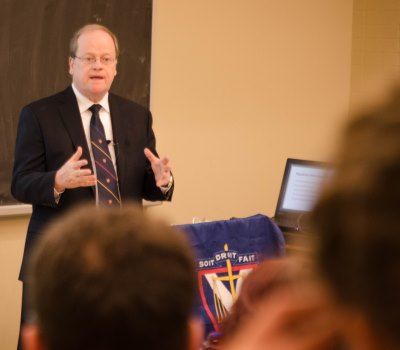
“First you have to want it.” That’s how Justice Thomas Cromwell, Law’76, LLD’10 (Mus’73) began his talk with eager Queen’s Law students.
On March 11, Cromwell returned to his alma mater to give the McCarthy Tétrault LLP Annual Lecture on Legal Ethics and Professionalism. For his hour-long talk, “The Legal Services Gap: Professional Responsibility and Access to Justice,” he explored how current regulation inhibits access to legal services and how it can be changed to ameliorate this problem.
“What could be more important to the legal profession than doing what we can to ensure that the public is not shut out of the legal information, services and resources it needs to meet legal problems?” This is the central question that Cromwell, Chair of the National Action Committee on Access to Justice in Civil and Family Matters, asks of professional regulators. “We have a lot of people who cannot get the services they require,” he said. “Broadening accessibility to information, advice and representation ought to be the number-one priority for the legal profession in Canada.”
Throughout the talk, Cromwell proposed a number of regulatory changes that could be made in order to improve access to justice. One example involves the existing unauthorized practice rules. “Traditionally only lawyers are permitted to provide legal advice, and while this rule is obviously designed to protect the public, it also can contribute to broadening the legal services gap,” he said. “I think the regulatory bodies should closely examine restrictions on non-lawyers and critically assess whether the present rules prevent forms of service delivery that are in the public interest.”
Cromwell stressed how access to justice, the most critical issue the legal profession faces, is particularly important for students and new lawyers. “I would urge you to individually and collectively become more engaged with some of these issues as part of your studies and as part of your conversations with each other in the law school,” he said. “You will need to have a concrete understanding of what the legal services gap is, what your roles and responsibilities are and what opportunities are there to make a good living and contribute to closing that gap at the same time.
“Your role,” he added, “is critical in bringing about the improvements I hope to see before hanging up my skates.”
Watch the full video of Justice Cromwell’s lecture at Queen’s Law.